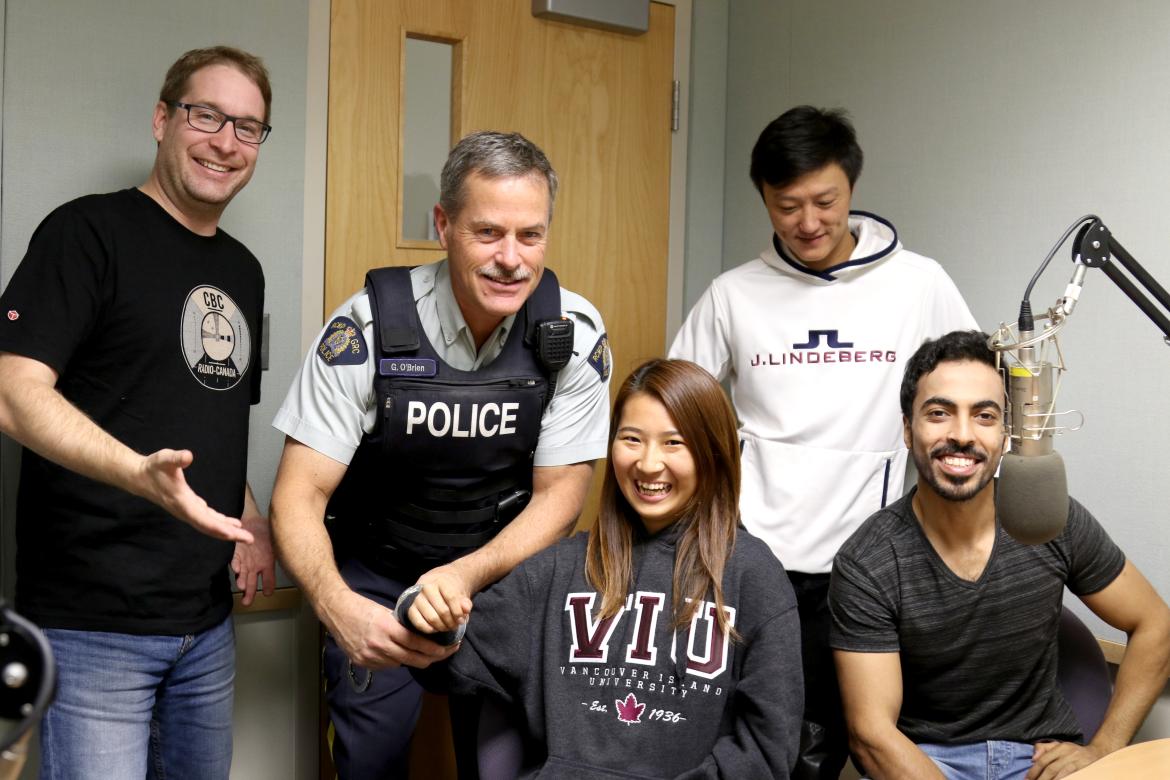
Cst. Gary O’Brien stopped in to the VIU Library recording studio to see how the Crime Stoppers recordings were going. VIU student Mayuko Kishida wasn’t finished so it was cuffs for her. CHLY’s Matt Carter, students Edwin Song (standing right) and Ziyad Aleid all had a good laugh. They are becoming good friends thanks to the Crime Stoppers project.
October 13, 2016 - 1:15pm
Nanaimo Crime Stoppers has partnered with VIU International and CHLY 101.7 to get their messages out to different language groups
The microphone is live and Vancouver Island University (VIU) international student Wei (Edwin) Song from Beijing confidently leans in to voice a Crime Stoppers message in his native Mandarin. He is one of four students who came together to assist Crime Stoppers coordinator, RCMP Cst. Gary O’Brien, with a pilot project designed to help the Nanaimo and Surrounding Area Crime Stoppers program reach more people.
“We know there are people out there who may see things happen and want to report it but because of language barriers or the fact that things may be done differently in their country of origin they don’t feel comfortable sharing with the police, even though it might help us solve a crime,” said O’Brien.
There are almost 2,000 international students at VIU from more than 80 countries. With the help of VIU’s Faculty of International Education, four students who represent some of the larger language groups on campus all agreed to help record public service announcements. Dr. Norma MacSween is the associate dean of the Faculty of International Education and the director of VIU’s English Language Centre. She says when they were approached by Cst. O’Brien about the project she recognized right away that it could have a positive impact.
“Quite often language barriers can make a person feel marginalized. This is a way to help international students and communities understand more about the laws and rules of Canada,” said MacSween. “By voicing Crime Stoppers messages and explaining how to report crimes in a language like Mandarin, everyone who speaks Mandarin and hears the message will stop and listen.”
The Radio Malaspina Society that operates VIU’s campus radio station, CHLY 101.7, offered to broadcast the Crime Stoppers announcements. CHLY radio programmer Matt Carter assists the students to ensure they are speaking into the mike properly, projecting their voices and that recording levels are correct. He says so far the students are doing a wonderful job. They are now on the second week of airing the recorded Crime Stoppers messages daily.
“Because we are a campus/community radio station this was a natural partnership for us,” said Carter. “We were excited to support the RCMP Crime Stoppers program in their efforts to reach a wider audience. At the same time we are drawing on the strength of VIU’s international student body to help us reach out to listeners whose first language isn’t English. It’s a project that really reflects our mandate.”
As Song finishes voicing the crime of the week he is joined in the VIU Library recording studio by Arabic speaker Ziyad Aleid, who is a fourth year VIU student from Saudi Arabia. Students Mayuko Kishida from Japan and Spanish speaker Sara Mann from Colombia arrive soon after. Song says he is honoured to participate.
“If other Mandarin-speaking students or community members see something happen, an emergency or something suspicious – it’s hard for them to know if they should call 911 or not. Now, if they hear these messages, they will know there is another way of sharing information that isn’t 911,” said Song.
As Aleid prepares to record his Arabic message he reflects on the project.
“When I came here four years ago I couldn’t speak English so I really understand why it could help. I feel like voicing these messages is the least I can do for the community. Also, it’s kind of cool to hear my voice on the radio,” said Aleid with a laugh.
O’Brien says historically the only way to communicate with Crime Stoppers was by phone but that has changed. They now receive more than 50 per cent of the tips they get from email or text, which is something they encourage. The underpinning premise of total anonymity is still protected but unlike leaving a phone message, with electronic communication officers can encourage a back and forth dialogue about the incident being reported by responding to the text or email.
“That two-way exchange is important because people may not report details that are important, but when asked to provide that information they share more and it helps us get that much closer to solving a crime,” said O’Brien. “People who report to Crime Stoppers don’t have to give their names and there may be a payment for helping. We guarantee absolute anonymity regardless of how the message comes in, but without explaining things like this in a person’s first language, these details can be difficult to get across.”
O’Brien says he expects to continue the program and possibly expand it to community television through Shaw TV. To report a crime or learn more about the Nanaimo and Surrounding Area Crime Stoppers program, go to: Nanaimo Crime Stoppers.
-30-
MEDIA CONTACT:
Dane Gibson, Communications Officer, Vancouver Island University
P: 250.740.6288 | C: 250.618.7296 | E: Communications@viu.ca | T: @viunews
Tags: In the Community






